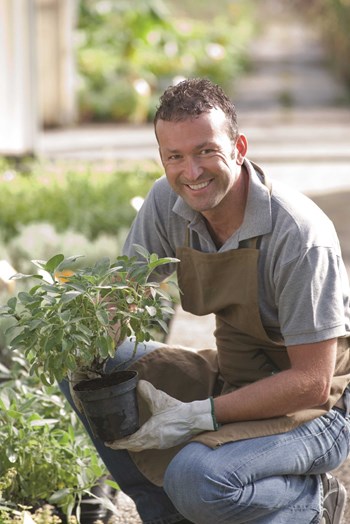
Part of the job of a condo board is to keep your association’s grounds or lawn looking healthy and attractive. After all, curb appeal can do wonders when it comes to appraisals and even the morale of your community members. But most condo boards—whether their urban or suburban—are populated with volunteers, few of whom are likely to be professional landscapers or horticulturalists.
That being the case, they’ll probably depend on a professional landscaper to maintain and beautify the grounds. We polled landscapers throughout New Jersey to figure out what you need to be asking the landscaper before you hand over the keys to your green space. Here are their top 10 questions, in no particular order:
Do you perform organic maintenance and practices? The New Jersey Pesticide control code requires that all pesticides used in New Jersey be registered with the Department of Environmental Protection prior to use and additional laws that are equally tough on pesticides are in the pipeline. Pesticide applications to lawn and turf is becoming a big no-no, says Susan Cohan, a landscape and garden designer in Chatham. “The state of New Jersey is making it more and more difficult to apply chemical based pesticides or fertilizers so organic maintenance is very popular right now,” says Cohan. “People who are employing organic lawn care are beginning to experience a lot more business because you can’t apply certain fertilizers anymore, you can actually be fined. A co-op board or association should certainly ask their lawncare professional about their organic practices.”
What type of post disaster or extreme weather cleanup do you offer?2011 snowfall totals reached record breaking numbers across New Jersey last year so Garden State residents should know what type of postdisaster maintenace their lawn care professionals offer, says Cohan. “New Jersey gets a lot of extreme weather like snow, sleet, ice and flooding. The winter of 2011 was particularly harsh,” says Cohan “Every place is different. Sometimes snow removal is included in the contract and it’s a flat rate. Some companies have an inch limit on snow cleanup. It’s important to know what the company’s threshold is and how you will be charged once it is reached.” Arkansas has tornadoes, New Orleans has floods and California has fires and New Jersey has snow, every region has a potential natural disater to contend with and you should have a cleanup plan in place, says Cohan.
Can I see a copy of the landscape audit? A landscape audit is a site assessment that gives you the information you need to transition to a sustainable landscape. It includes detailed inventory and analysis of the landscape surrounding your property and provides guidance on the how’s and why’s of creating sustainability on your site. “I like to put a 3- to 5-year plan together,” says Goldman. “As things mature, you need to identify problem areas, things that need to be changed, how things should be pruned, when they should be pruned. Because horticulturally, it all wraps up together. If the trees wrap up the lawn, you are not getting proper moisture or sunlight. When that happens most people try to overcompensate by throwing more fertilizer down—when that is the case, maybe just pruning the trees will help.” An audit doesn’t need to be done more than once every five years. It is just a plan to put everything together so that you know what is there and how everything is working, says Goldman.
Are all of your crew members properly documented?Though a condo board wouldn’t necessarily be on the legal hook if one of their vendors is caught using illegal labor, it’s still a good idea to ask, says Stephen Faulkner, president of New England-based Faulker Landscaping & Nursery. “If a company is using foreign labor, make sure they are here on legal work visas,” says Faulkner. “Oftentimes, an immigration board will spot-check work sites to see if landscapers have correct paperwork on their employees. If the paperwork isn’t in order, then boom, in some cases half the workforce is gone the very next day.”
How experienced is your pruning crew? How many years of experience do they have? Are they properly trained? What is their knowledge? These are all questions association boards should ask their landscapers, says Faulkner. “If a landscaper is not using the same pruning crew year after year, this can cause a problem. You can have one person come in and prune a certain way, and another person come in the following year and prune a different way. There’s two types of pruning: there’s shaping plants, which most landscapers can do, but when you go into different cuts, working on a tree to create a certain architectural shape, that requires a different skill level.” The worst case scenario would be that someone else comes in and is either inexperienced, or has a completely different vision for the tree “and the tree gets butchered,” says Faulkner.
Have you serviced other sites this size? It’s admirable to employ a start-up company or a mom-and-pop operation, but you have to make sure they are up for the job. “If you hire a growing company, make sure they are not biting off more than they can chew,” says Faulkner. “Once a guy came in and underbid my company—he did the job for two years, but his work was inconsistent and the client wasn’t happy with his work. We came in on year three and had to take over because the guy just got overwhelmed. It was the first time he was doing a job of that size, and he was having a tough time finding dependable labor.”
Will you remove excess mulch?Mulch is laid over the surface of the soil as a covering. It is used to retain moisture in the soil and it also suppresses weeds, but using too much can backfire. “Most landscapers don’t factor in removing excess amounts of mulch that may be piling up from previous years,” says Faulkner. “If too much mulch is used, plants can be impaired for years down the road. They can also pick up diseases from the excessive mulch. Then you are looking at a possible situation that these plants are dead and diseased and there is a possibility that they could be spreading disease to other plants.” It would be an added expense to replace the plants but it would have to be done to keep the condo owners happy, he says.
Will you do snow removal?If you live in New Jersey, you’ve lived through enough blizzards to know how expensive snow removal can be. But here’s a little secret, says Scott Grams, who is with the Landscape Contractors Association chapter in the Midwest. “Sometimes, you can work a better contract if you mix landscaping and snow removal together,” Grams says. “Also, if they know they’re also doing the snow portion, they’ll have a better knowledge of how and where to push the snow when it’s covering all the landscaping.” Grams says there are plenty of great landscaping companies that don’t do snow removal, but if you’re looking for a deal, find one that will do both services for one good price. Another bonus of having the two combined is that you always know who to call when you need service done in your green space—and you know that they won’t be trampling over your garden when they’re removing the snow because that only means more work for them.
What’s your solution? Landscapers should be able to do more than simply following the associations’ directions to create a beautiful green space. Because let’s face it: most people on the association or condo board aren’t experts in landscaping. So when you’re interviewing a prospective landscaper, ask them about problems that your specific building faces, Grams says. For example, have you noticed that the grass under your tree is having a hard time growing? So every year, you’ve been putting more sod down next to the tree in the hopes that the sod will help the grass grow taller, greener and thicker? Try asking the landscaper what he or she would do in that situation. “It should be up to the landscaper to think outside the box, and think of other creative solutions,” Grams says. Or, if you spend time and money pruning the hedges under your windows every few months—and you’re required to call maintenance to trim the hedges on a weekly basis—ask them how they can save money on this. Perhaps, they’ll suggest putting in new hedges that don’t grow over a certain height.
Do you have a single point of contact? Picture this: A resident notices that a tree is curving dangerously low to the ground. So when he spots someone working on pruning the hedges, he runs downstairs and points out the problem. The worker smiles, nods and agrees that there’s an issue. A few weeks later, when the tree comes crashing down, the resident complains that he already told the landscaper about the problem, and it was never fixed. Here’s where the problem lies, says Grams: You need to make sure that there’s a singular point of contact with your landscaping company—one person whom the residents can call if they have a problem, who will be the one to coordinate any work or maintenance that needs to be done. Typically, this person is called the site coordinator or the sales person, but it’s key that they’re willing to give out their phone number or e-mail address so that everyone living in the community can report any issues that they see happening.
Danielle Braff is a freelance writer and a frequent contributor to The New Jersey Cooperator. Staff Writer Christy Smith-Sloman contributed to this article.






Comments
Leave a Comment